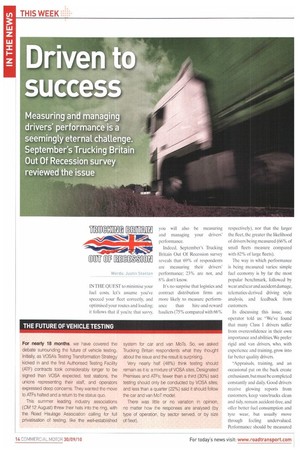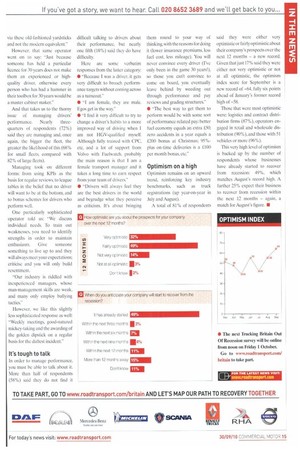Driven to success
Page 14

Page 15

If you've noticed an error in this article please click here to report it so we can fix it.
Measuring and managing drivers' performance is a seemingly eternal challenge. September's Trucking Britain Out Of Recession survey reviewed the issue
Words: Justin Stanton IN THE QUEST to minimise your fuel costs, let's assume you've specced your fleet correctly, and optimised your routes and loading; it follows that if you're that savvy, you will also be measuring and managing your drivers' performance.
Indeed. September's Trucking Britain Out Of Recession survey reveals that 69% of respondents are measuring their drivers' performance; 23% are not, and 8% don't know.
Ifs no surprise that logistics and contract distribution firms are more likely to measure performance than hire-and-reward hauliers (75% compared with 66% respectively), nor that the larger the fleet, the greater the likelihood of drivers being measured (6(1% of small fleets measure compared with 82% of large fleets).
The way in which performance is being measured varies: simple fuel economy is by far the most popular benchmark, followed by wear and tear and accident damage, telematics-derived driving style analysis, and feedback from customers.
In discussing this issue, one operator told us: "We've found that many Class 1 drivers suffer from overconfidence in their own importance and abilities. We prefer rigid and van drivers, who, with experience and training, grow into far better quality drivers.
-Appraisals, training, and an occasional pat on the back create enthusiasm,but must be completed constantly and daily. Good drivers receive glowing reports from customers, keep vans/trucks clean and tidy, remain accident-free, and offer better fuel consumption and tyre wear, but usually move through feeling undervalued. Performance should be measured
via these old-fashioned yardsticks and not the modem equivalent" However, that same operator went on to say: "Just because someone has held a particular licence for 30 years does not make them an experienced or highquality driver, otherwise every person who has had a hammer in their toolbox for 30 years would be a master cabinet maker," And that takes us to the thorny issue of managing drivers' performance. Nearly threequarters of respondents (72%) said they are managing and, once again, the bigger the fleet, the greater the likelihood of this (68% for small fleets, compared with 82% of large fleets).
Managing took on different forms: from using KPLs as the basis for regular reviews, to league tables in the belief that no driver will want to be at the bottom, and to bonus schemes for drivers who perform well.
One particularly sophisticated operator told us: "We discuss individual needs. To train out weaknesses, you need to identify strengths in order to maintain enthusiasm. Give someone something to live up to and they will always meet your expectations; criticise and you will only build resentment.
"Our industry is riddled with inexperienced managers, whose man-management skills are weak, and many only employ bullying tactics."
However, we like this slightly less sophisticated response as well: "Weekly meetings, good-natured mickey-taking and the awarding of the golden dipstick on a regular basis for the daftest incident."
Its tough to talk
In order to manage performance, you must be able to talk about it. More than half of respondents (58%) said they do not find it difficult talking to drivers about their performance, but nearly one fifth (18%) said they do have difficulty.
Here are some verbatim responses from the latter category: • "Because 1' was a driver, it gets very difficult to broach performance targets without coming across as a turncoat."
• "I am female, they are male. Egos get in the way."
• "I find it very difficult to try to change a driver's habits to a more improved way of driving when I am not HGV-qualified myself, Although fully trained with CPC, etc, and a lot of support from Volvo with Fuelwatch. probably the main reason is that I am a female transport manager and it takes a long time to earn respect from your team of drivers:' • "Drivers will always feel they are the best drivers in the world and begrudge what they perceive as criticism. Ifs about bringing them round to your way of thinking, with the reasons for doing it (lower insurance premiums, less fuel cost, less mileage). You will never convince every driver (I've only been in the game 30 years!), so those you can't convince to come on board, you eventually leave behind by weeding out through performance and pay reviews and grading structures."
• "The best way to get them to perform would be with some sort of performance-related pay: better fuel economy equals an extra f.50; zero accidents in a year equals a £200 bonus at Christmas; 95%plus on-time deliveries is a £100 per month bonus, etc."
Optimism on a high
Optimism remains on an upward trend, reinforcing key industry benchmarks, such as truck registrations (up year-on-year in July and August).
A total of 81% of respondents said they were either very optimistic or fairly optimistic about their company's prospects over the next 12 months — a new record_ Given that just 17% said they were either not very optimistic or not at all optimistic, the optimism index score for September is a new record of +64, fully six points ahead of January's former record high of +58.
Those that were most optimistic were: logistics and contract distribution firms (87%), operators engaged in retail and wholesale distribution (90%), and those with 51 vehicles or more (96%).
This very high level of optimism is backed up by the number of respondents whose businesses have already started to recover from recession; 49%, which matches August's record high. A further 25% expect their business to recover from recession within the next 12 months — again, a match for August's figure. Id




























































































































